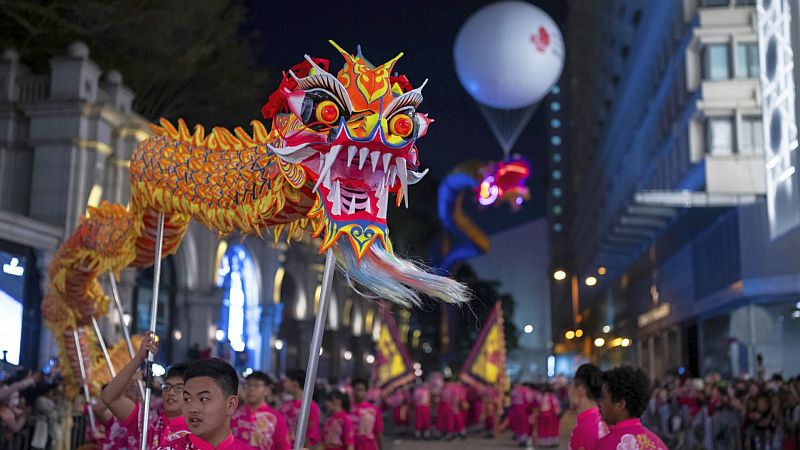
Participants take part in the International Lunar New Year Parade on the first day of the Lunar New Year of the Dragon in Hong Kong, Saturday, Feb. 10, 2024. (Louise Delmotte / AP)
February 12, 2024
Updated February 17, 2024
Lion dancers, preschoolers, seniors and members of a local martial arts club will be gathering Saturday in a celebration of the Lunar New Year at a community center in Dorchester — the first time the nonprofit Vietnamese-American Initiative for Development, or VietAID, will be holding the event since the beginning of the pandemic.
The joyous fete celebrates Tết Nguyên Đán, the Vietnamese New Year. It’s just one of several festivals, parades and celebrations held by Asian communities across the state for Lunar New Year.
Many activists say the celebrations are particularly poignant now that Asian American and Pacific Islander communities are facing increased hate and discrimination across the country following targeting in the early days of the COVID-19 pandemic.
“We experienced so much as a community, and we’re just so happy to be back in the swing of things, celebrating and in community with one another,” said George Huynh, executive director of the the Vietnamese-American Initiative for Development, also known as VietAID. “But this threat, this rise in hate crimes, is still prevalent. In addition to all the positive things, we want to make sure we do shine a line on the negative impacts that our community has faced and continues to face today.”
Many Lunar New Year celebrations included the traditions of multiple communities, including traditional Chinese lion dance parades, Mongolian communities celebrating Tsagaan Sar and Korean Seollal traditions. A gala at Boston City Hall last Saturday, held by the New England Chinese American Alliance, included performances by Japanese singers and Korean dancers.
“Everyone is welcome, and every year we invite members of other local communities, like the Latino community and Black community, to join us,” Alliance president Gary Yu said. “All are invited to share in our traditions and culture and good food.”
Huynh says it’s significant that VietAID’s celebration returned in the Year of the Dragon, which symbolizes courage, strength, rebirth and sweeping unity.
“We’re growing as a community, and we feel like folks — especially our younger generations — are increasingly becoming more culturally competent and respectful,” Huynh said. “That’s a great trend to see.”
Asian Americans make up about 6% of the total Massachusetts population and are the fastest-growing racial or ethnic group in the country, according to data from the Pew Research Center.
Nationally, hate crimes against Asian Americans and Pacific Islanders surpassed record numbers in some major U.S. cities in 2020, according to crime data from Harvard’s Center for the Study of Hate and Extremism. The following year, anti-AAPI hate crime increased by 339% as compared to 2020.
Despite a 34% decline in anti-AAPI hate crimes in 2022 as reported by the FBI, Asian Americans in Massachusetts have faced a steady increase of xenophobia and racism since 2015, according to a 2021 report from the state’s advisory committee on civil rights.
Sifu-Mai Du, who operates the Wah Lum Kung Fu and Tai Chi Academy in Malden, says racial bias and hate crimes are still a major problem for AAPI communities in Massachusetts. He says former President Donald Trump’s comments about COVID-19 originating in China were the cause of a significant jump in anti-AAPI hate.
“It heightened during the pandemic simply because of all the Trumpism that’s happening around us,” Du said during an interview Friday with GBH News’ Boston Public Radio. “During that time, so many seniors — not just seniors, but I would say particularly seniors — were so scared to even leave their home to go to … grocery stores or see their families.”
To address this, Du and her team led a series of free community self-defense training courses — programs that have been extended thanks to funding from the Boston Foundation’s Asian Community Fund and the AAPI Commission of Massachusetts.
“We’re still doing those trainings in different parts of the state,” she said, “because we hear that folks are wanting to have this training to feel more empowered and to have a little bit of peace of mind.”
Irene Li, an award-winning chef, appeared on Boston Public Radio with Du. Co-founder of the food truck–turned–dumpling restaurant Mei Mei, Li said that she hopes to soon offer some of Du’s self-defense classes at the South Boston restaurant later this year.
“Even though we may be seeing less of it in the headlines, at a community level, there is still a lot of fear,” she said. “So much of why we do these cultural events is to try to empower people to feel proud and have a sense of agency about their identity, whether it is folding dumplings, defending yourself, feeling like you can walk down the street safely.”
Tori Bedford
(tori_bedford@wgbh.org)
She covers the Boston neighborhoods of Dorchester, Roxbury and Mattapan for the GBH News Dorchester Bureau.